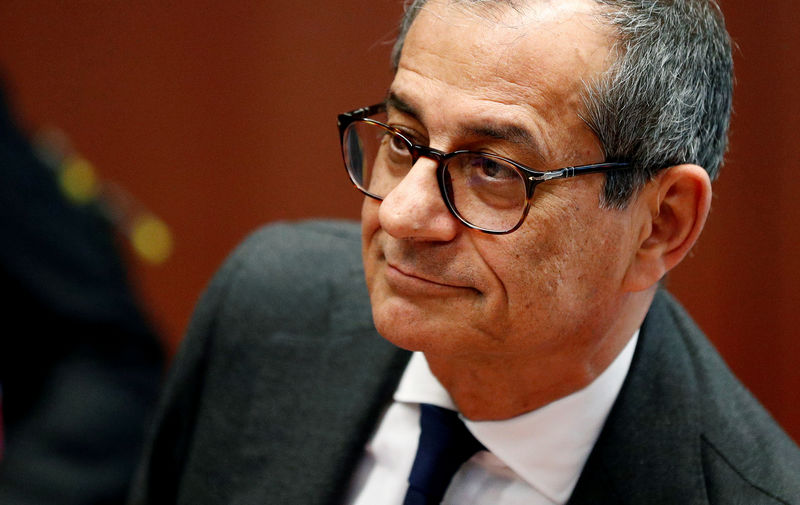By Giselda Vagnoni and Silvia Aloisi
ROME (Reuters) - The Italian government is confident it can reach a compromise with Brussels and avoid sanctions over its deteriorating public finances, the economy minister said as talk of a looming government crisis grew.
The European Commission wrote to Italy last week asking it to explain why its public debt rose in 2018 instead of falling as required, a move that set the stage for a possible legal clash with the ruling eurosceptic coalition in Rome.
In his response to Brussels, Economy Minister Giovanni Tria blamed an economic downturn for the rising debt and vowed to respect the EU's fiscal rules in the next budget.
But a report in La Repubblica daily on Sunday said the EU Commission had found Tria's letter too vague and non-committal, and was likely to take the first steps toward a disciplinary procedure this week.
Speaking to Reuters on the sidelines of a ceremony at the presidential palace in Rome on Saturday night, Tria said he believed the government could still avert such punitive measures.
"Italy does not want to clash with the European Commission, and I hope the opposite is also true, that is to say that no one in Brussels intends to engage in a fight with us," he said.
"Our position is reasonable and I think we will eventually reach a compromise with the Commission," he added.
He also reiterated a pledge that the 2019 budget deficit would come in below a government forecast of 2.4% of gross domestic product - a level the Commission deems too high.
Tria is a former academic with no affiliation to either of the two ruling parties governing Italy - the right-wing League and the anti-establishment 5-Star Movement, which are both backing tax cuts that would likely inflate the deficit.
The League's anti-EU rhetoric in particular has gone up a notch after its victory in European parliamentary elections, with its chief Matteo Salvini insisting that Rome should cut taxes to boost growth, rather than abide by "obsolete" EU fiscal rules that could choke the economy.
The League won 34.3% of the vote in last week's European elections, trouncing its coalition partner and fuelling speculation it might ditch 5-Star and seek a fresh national election at the head of a bloc of smaller conservative parties.
DISCIPLINARY PROCESS
La Repubblica said the start of an EU disciplinary procedure against Italy this week was "almost inevitable" unless the government could come up with a convincing set of commitments to keep its rising debt and deficit in check.
The EU Commission declined to comment on Sunday, saying it would publish its views on Italy's public finances on Wednesday.
If it says on Wednesday that there is room to launch a disciplinary procedure that would be the first step in a drawn-out legal process that could lead to financial sanctions and a stricter oversight of the country's fiscal policy.
European Economic Commissioner Pierre Moscovici said on Sunday that he preferred dialogue to sanctions as a means to enforce the bloc's budget rules.
"If they do not respect the rules at all, it will be necessary for the European Commission and the European states to take their responsibilities. Europe is also a co-ownership, there are rules that everyone must respect," he said on FranceInter radio, when asked about Italy.
"For now my motto is: dialogue, dialogue, dialogue," Moscovici said.
Rome recorded public debt of 132.2% of gross domestic
product last year, up from 131.4% in 2017, the highest in the EU after Greece. Italy's debt is also set to expand this year and next, according to the EU Commission's forecasts.
Daily Il Messaggero's front-page headline on Sunday read "Government crisis around the corner", adding Salvini could use the fight with the EU to sink the ruling coalition, which has been in power since last year, and seek early elections.
Salvini has pledged that the government would serve its full five-year term, but a League minister told Reuters on condition of anonymity that he did not expect the executive to last another year.
